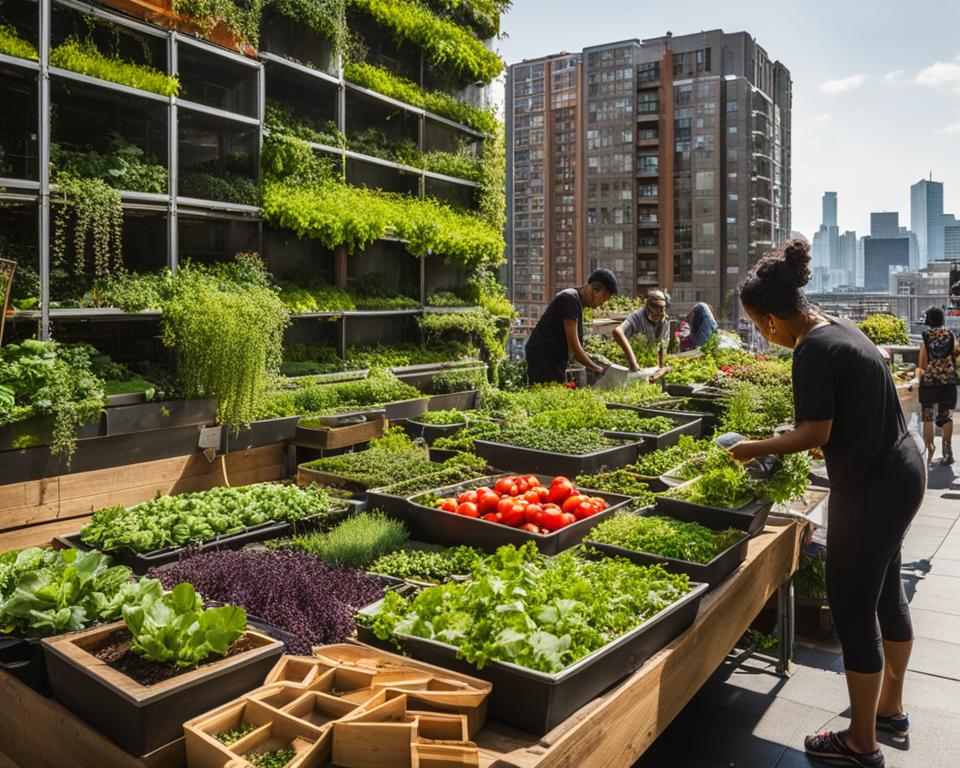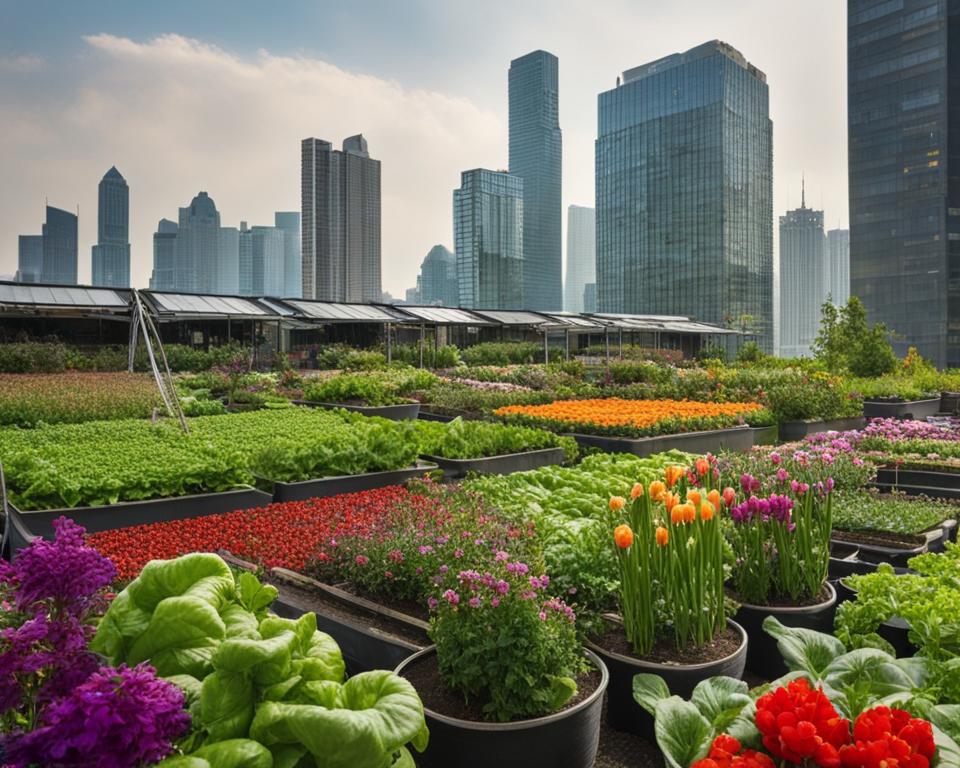As an urban dweller, you may be wondering how you can embrace sustainable living and reduce your environmental impact. One solution is urban gardening, a practice that involves growing plants and vegetables in an urban environment. Not only is urban gardening beneficial for the environment, but it also offers numerous economic advantages that can enhance your city lifestyle, save you money, and provide you with fresh produce right from your own backyard.
Whether you have a spacious backyard or a small balcony, you can utilize every inch of your space for urban gardening. With the right tools, knowledge, and resources, you can create a fruitful garden that will not only provide you with fresh produce but also contribute to a healthier environment and stronger community bonds.
Key Takeaways:
- Urban gardening is a sustainable practice that involves growing plants and vegetables in urban environments.
- Engaging in urban gardening offers numerous economic benefits, including cost savings, potential side hustle opportunities, and increased food security.
- Urban gardening also promotes environmental sustainability, mental and physical health, educational opportunities, and community resilience.
- With the right tools, knowledge, and resources, anyone can start their own urban garden and reap the economic advantages and so much more.
Understanding Urban Gardening
Before I delve into the economic benefits of urban gardening, let’s first understand what this practice entails. Urban gardening refers to the cultivation of plants and vegetables in urban environments, such as rooftops and balconies, or communal spaces like community gardens. This form of gardening has become increasingly popular due to its positive impact on the environment, community, and personal health.
Urban gardening offers numerous benefits, making it an attractive option for many city dwellers. Individuals and communities can benefit from cost savings, environmental sustainability, and education opportunities. Let’s explore the benefits of urban gardening in more detail.
Environmental Sustainability
There are many advantages of urban gardening, but one of the most significant is its positive impact on the environment. Urban gardening is considered a sustainable practice due to its ability to reduce carbon footprints, mitigate heat islands, and improve air quality.
How does urban gardening achieve this? One way is by reducing the need for commercial transportation and packaging associated with grocery store produce. When you grow your own food, you significantly reduce the carbon emissions generated by transportation. Moreover, urban gardens act as green spaces, absorbing carbon dioxide, releasing oxygen and contributing to cleaner air.
According to a study by the University of Illinois, urban gardens can help reduce the urban heat island effect. This phenomenon occurs when urban areas become significantly warmer than surrounding rural areas due to the heat-absorbing properties of asphalt and concrete. By creating green spaces in the city, urban gardens counteract this effect by providing shade and cooling the air through plants’ photosynthesis process.
Urban gardens also help improve air quality in cities. Plants absorb pollutants through their leaves and release purified air through their roots. A study published in the Journal of Environmental Quality found that urban gardens can help reduce atmospheric particulate matter, reducing the likelihood of respiratory diseases.
| Environmental Benefits of Urban Gardening | |
|---|---|
| Reduction of carbon footprint through decreased dependence on commercial transport and packaging | Improvement of air quality through plant absorption of pollutants |
| Decrease in urban heat island effect by providing shade and cooling the air |
With these environmental benefits in mind, urban gardening becomes not just a beneficial activity for individuals, but also a powerful way to contribute to the community’s well-being.
Cost Savings
One of the most significant economic benefits of urban gardening is cost savings. By growing your own produce, you can save a considerable amount of money on groceries. For example, according to a study by the National Gardening Association, a $70 investment in a vegetable garden can yield an average of $600 worth of produce.
Not only does urban gardening save you money on groceries, but it also helps you become less susceptible to food price fluctuations and shortages. When the cost of produce goes up, you won’t have to worry as much because you can rely on your own garden to provide fresh fruits, vegetables, and herbs. Additionally, you can save money by reducing the amount of food waste in your household. You can pick only what you need, reducing spoilage and waste.
Productivity as a Side Hustle
Did you know that urban gardening can also serve as a profitable side hustle? With the right space and resources, you can turn your surplus produce into extra income by selling it to local businesses, markets, or neighbors. This entrepreneurial endeavor not only generates additional income, but it also promotes local food systems and fosters community connections.
| Produce Type | Market Price | Cost to Produce | Profit Margin |
|---|---|---|---|
| Tomatoes | $2.50/lb | $0.50/lb | $2.00/lb |
| Lettuce | $1.50/head | $0.20/head | $1.30/head |
In the table above, we can see how selling your own produce can be a lucrative business. Tomatoes, for instance, have a profit margin of $2.00 per pound, while lettuce has a profit margin of $1.30 per head. By growing your own food, you not only save money on grocery bills but also have the potential to earn some extra income.
Moreover, selling your own produce also allows you to share your love for urban gardening and introduce others to the economic benefits of this sustainable practice. With the growing demand for locally-grown and organic produce, urban gardening can open up a world of opportunities for ambitious gardeners.

“Children with a garden are more likely to eat fruits and vegetables and learn environmental skills.” – American Heart Association
| Benefits of Urban Gardening for Education | Examples |
|---|---|
| Teaches Sustainable Practices | Composting, waste reduction, water conservation |
| Encourages Nutrition and Healthy Eating Habits | Planting and consuming fruits, vegetables, herbs |
| Facilitates Science and Environmental Education | Seed germination, pollination, pest control, soil composition |
| Promotes Collaboration and Community Engagement | Shared responsibility, teamwork, leadership, communication |
| Enhances Creativity and Critical Thinking | Garden design, problem-solving, decision-making |
By fostering educational opportunities through urban gardening, we not only empower ourselves and those around us with valuable knowledge, but also contribute to a more sustainable, healthier, and resilient community.
Strengthening Community Bonds
One of the greatest advantages of urban gardening lies in its ability to bring people together and strengthen community bonds. The act of gardening creates a shared sense of responsibility and offers a platform for collaboration and teamwork.
Community gardens, in particular, are excellent places to meet and connect with neighbors. They provide communal spaces where people can grow their own produce, exchange gardening tips, and share recipes.
Through these interactions, people develop stronger social ties and a sense of belonging, fostering a more tightly knit community.
Furthermore, community gardens foster a greater respect for the environment and sustainability. By engaging in a shared project aimed at nurturing and preserving nature, people become more aware and invested in ecological issues.
The Power of Connection
“Community gardens are a powerful tool for bringing people together and fostering a sense of connection and ownership over the places where we live, work and play.”
By creating shared spaces that benefit all members of the community, urban gardening can help break down social and economic barriers. People from different backgrounds can come together around a shared passion, forging new connections and creating a more inclusive community.
Ultimately, urban gardening creates a platform for social change and collective action, empowering people to take control of their lives and build a more sustainable future.
Supporting Food Security
One of the most significant economic benefits of urban gardening is the support it provides to food security. Urban gardening plays a crucial role in reducing dependence on external food sources, thus ensuring access to fresh and nutritious produce for individuals and communities.
In times of crisis, such as natural disasters or disruptions in the food supply chain, urban areas equipped with food-producing facilities become more self-sufficient. Having access to fresh fruits and vegetables can contribute to overall health and well-being, especially for vulnerable populations who may not have access to traditional food sources.
Moreover, urban gardening also supports local economy by creating jobs and entrepreneurship opportunities. Community gardens and urban farms can become sources of food and income for residents, especially in low-income neighborhoods where fresh produce may be scarce.
In addition to supporting food security, urban gardening also helps redefine our relationship with food and the environment. By growing our own food, we become more aware of the sources and quality of our food, and more conscious of the environmental impact of our consumption habits.
As I learned during my own urban gardening journey, engaging in sustainable practices not only brings economic benefits but also provides a sense of personal fulfillment and satisfaction. Join the movement towards urban gardening and contribute to building a more sustainable and resilient future.
Conclusion
As I’ve explored in this article, urban gardening is a sustainable practice with numerous economic benefits that can enhance my city lifestyle. By reducing my carbon footprint, providing fresh produce, and offering educational opportunities, urban gardening can save me money and improve my overall health and well-being.
Start Small
If you’re interested in urban gardening, don’t feel overwhelmed by the process. Starting small is the key to success. Consider growing herbs on your windowsill or planting a small vegetable patch in your backyard. Once you get the hang of it, you can expand your garden and experiment with different crops.
Join a Community
Joining a community garden is a great way to learn from experienced gardeners and meet like-minded individuals. By contributing to a shared space, you can also build stronger community bonds while enjoying a bountiful harvest.
So what are you waiting for? Whether for economic benefits or personal fulfillment, urban gardening is a rewarding and accessible activity to try. With a little patience and dedication, you can transform your city life and thrive.
FAQ
What is urban gardening?
Urban gardening refers to the practice of growing plants and vegetables in urban environments, such as rooftops, balconies, or community gardens.
What are the economic advantages of urban gardening?
Urban gardening provides economic benefits such as cost savings, potential side hustle opportunities, and increased food security.
How does urban gardening promote environmental sustainability?
Urban gardening promotes environmental sustainability by reducing carbon footprints associated with commercial transportation and packaging, improving air quality, and acting as green spaces that absorb carbon dioxide and reduce heat islands.
Can urban gardening save me money?
Yes, engaging in urban gardening can bring significant cost savings as you can grow your own fruits, vegetables, and herbs at a fraction of the cost of purchasing them from grocery stores.
Can urban gardening be a profitable side hustle?
Yes, if you have the space and resources, you can sell your surplus produce to local markets, restaurants, or neighbors, generating additional income and promoting local food systems.
Does urban gardening have any health benefits?
Yes, urban gardening offers mental and physical health benefits, including stress reduction, improved mood, increased fitness levels, and a more active lifestyle.
How can urban gardening be educational?
Urban gardening provides excellent educational opportunities, offering hands-on learning experiences about sustainable practices, nutrition, and the environment to children and urban communities.
Does urban gardening strengthen community bonds?
Absolutely, urban gardening plays a crucial role in building stronger community bonds by encouraging collaboration, teamwork, and shared responsibility among neighbors.
Can urban gardening contribute to food security?
Yes, by reducing dependence on external food sources, urban gardening helps support food security, ensuring access to fresh and nutritious produce even during crises or disruptions in the food supply chain.

